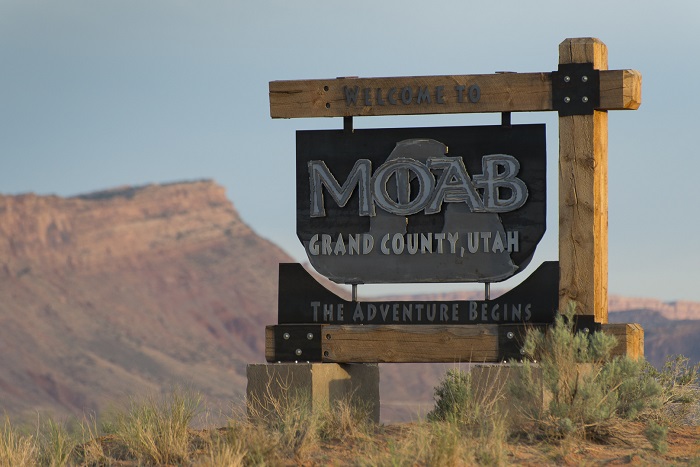
With its red rock and blue sky, Moab is a land of contrasts. But another stark contrast is that of growth-oriented business owners and the residents who see the recent growth as perhaps too much of a good thing.
The economic, social, and political landscape of Moab has changed dramatically since the uranium-based economy came to an end several decades ago, and recreational tourism grew in its wake. Moab’s tourism-based economy is booming, with thousands of national and international visitors each year. It’s a juggling act for leaders to manage the myriad of issues surrounding growth with such environmentally-conscious residents. But this consciousness is a big reason why so many want to move here.
Currently, the biggest issue Moab faces is a crisis-level shortage of housing that is affordable to the people whose work powers the local economic engine. The unprecedented level of visitation has had a high impact on the infrastructure, and on public services such as law enforcement, as well as the quality of life for full-time residents.
These issues must be addressed in a way that both satisfies the public, stays within the budget, and respects the natural boundaries of what this arid landscape can support—particularly as Moab relies heavily on a finite, underground water supply.
Moab recently elected a new mayor who has demonstrated success in combining economic, environmental, and social sustainability. Mayor Emily Niehaus is the founding director of Community Rebuilds, a non-profit organization building energy efficient, straw bale homes that use both active and passive solar energy. Student interns provide much of the labor of home construction, which keeps costs down and puts home ownership within reach of those who could not afford it otherwise.

According to Niehaus, Community Rebuilds has built twenty-two homes in Moab to date. Two hundred and fifty students have been educated in their Foundation to Finish construction program. Niehaus brings this holistic approach into her new position as mayor.
“We take a look at overall sustainability: food, water, shelter and air. Then, we use that as our baseline for how we develop policies,” Niehaus said. “And from there, we take a regenerative approach to solution-based projects.”
Niehaus comes to the City at a time in which there is already momentum toward sustainability. The Moab City Council established the position of Sustainability Director after adopting an updated Water Conservation Plan and passing a resolution for a community goal of 100 percent renewable energy by 2032. Dr. Rosemarie Russo was hired for the position.
“I am looking forward to working with Emily on the new Green to Gold Sustainability Program for businesses in town,” said Russo, referring to an outreach program that assists businesses in making green choices that also help their bottom line. “Adventure Inn is the first partner. They installed 100% onsite solar for the hotel.”
City Council member Rani Derasary has also worked on sustainability issues previously. “The economy, public health, and the environment—Emily has a great sense of integrating these at all levels,” she said.

Niehaus embraces the challenges ahead. “Our greatest need is tied to our greatest opportunity,” she said. “It is important to recognize that if we are going to face the challenges of climate change, we need to be a part of the greater solution strategies.”
FOR MORE MOAB RELATED STORIES GO HERE





